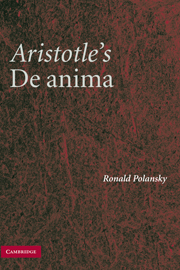Book contents
- Frontmatter
- Contents
- Preface
- List of Abbreviations
- Introduction
- COMMENTARY ON DE ANIMA: : Book 1
- COMMENTARY ON DE ANIMA: Book 2
- COMMENTARY ON DE ANIMA: Book 3
- 1 In the World As It Is There Can Be but the Five Senses
- 2 What Allows for Perceiving That We Perceive; Sense Joins in a Common Power so That the Five Senses Are Subfaculties of a Central Sense Faculty
- 3 Distinguishing Sense and Thought; What Is Phantasia?
- 4 What Is Mind as That Capable of Thinking All Things
- 5 What Enables Thinking to Occur
- 6 The Sorts of Intelligible Objects
- 7 Phantasia Has a Role in All Thinking
- 8 That Mind Can Think All Things
- 9 There Is a Capacity for Progressive Motion
- 10 The Desiderative Capacity Is the Primary Cause of Progressive Motion
- 11 Even the Simplest Animals Have Indefinite Phantasia, and Calculative Phantasia Fits the Account of Progressive Motion
- 12 The Necessary Order of the Faculties of Soul
- 13 The Sort of Body Requisite to Support the Order of the Faculties of Soul
- Bibliography
- Index
1 - In the World As It Is There Can Be but the Five Senses
Published online by Cambridge University Press: 18 December 2009
- Frontmatter
- Contents
- Preface
- List of Abbreviations
- Introduction
- COMMENTARY ON DE ANIMA: : Book 1
- COMMENTARY ON DE ANIMA: Book 2
- COMMENTARY ON DE ANIMA: Book 3
- 1 In the World As It Is There Can Be but the Five Senses
- 2 What Allows for Perceiving That We Perceive; Sense Joins in a Common Power so That the Five Senses Are Subfaculties of a Central Sense Faculty
- 3 Distinguishing Sense and Thought; What Is Phantasia?
- 4 What Is Mind as That Capable of Thinking All Things
- 5 What Enables Thinking to Occur
- 6 The Sorts of Intelligible Objects
- 7 Phantasia Has a Role in All Thinking
- 8 That Mind Can Think All Things
- 9 There Is a Capacity for Progressive Motion
- 10 The Desiderative Capacity Is the Primary Cause of Progressive Motion
- 11 Even the Simplest Animals Have Indefinite Phantasia, and Calculative Phantasia Fits the Account of Progressive Motion
- 12 The Necessary Order of the Faculties of Soul
- 13 The Sort of Body Requisite to Support the Order of the Faculties of Soul
- Bibliography
- Index
Summary
Though the divisions of Aristotle's treatises into chapters cannot be attributed to Aristotle himself, and even division into books may derive from editors, the present division of books 2 and 3 of the De anima, in spite of the fact that the subject is still sense perception, seems appropriate. Book 2 carries out completely the project of a general account of sense perception applying to the five particular senses (see 416b32–33 and 424a17–19). Chapters 5 and 6 suggest that this general account must concentrate upon sense in terms of the proper sensibles (see 418a24–25), and subsequent chapters elaborate upon perception of the proper sensibles through media and sense organs. Thus book 2 demarcates the formal and material components of sense perception of each of the five senses. Book 3 introduces a new line of reflection upon sense perception, turning to the interconnection of the five senses and their relation with other faculties of soul. The opening two chapters deepen the general understanding of sense perception as well as prepare for the coming discussion of intellect and progressive motion. Book 2 could seem quite narrow in its limitation of perception to distinct ranges of sensible objects such as white or sweet; the reflection upon the interrelation of the senses in book 3 enters somewhat more into the lived experience of percipient beings that includes perception of common sensibles, accidental sensibles, and the whole field of perceptible things.
- Type
- Chapter
- Information
- Aristotle's De AnimaA Critical Commentary, pp. 361 - 379Publisher: Cambridge University PressPrint publication year: 2007



